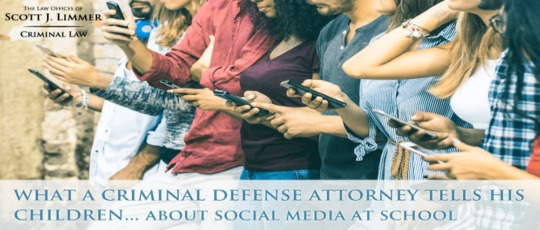School Discipline in the Past
Over my years as a criminal defense attorney, I often get calls to represent students at high-school disciplinary hearings. When I first started practicing in 1998 most of those hearings stemmed from one or more of three main factors: drugs, weapons or fights.
However, challenging it might be to defend a student in cases like these, at least the charges and often the evidence was usually straightforward. If a student was charged with possessing or using drugs or weapons, that usually meant someone at the school had found some drugs or weapons on the person of my client. And it there was a fight, it would usually attract, a significant number of witnesses, able to offer numerous perspectives and statements on what had happened, and maybe why as well. Pretty straightforward. Action took place on school property. Wrongdoer is easily identified.
The Current State of School Discipline of Social Media Conduct
But today, in the age of social media, things have changed in several important ways. First, most schools, rightly or not, feel empowered or compelled to assume a wider, more active role in disciplining young people. Especially in the case of conduct using social media, disciplinary hearings are no longer restricted to what happened at school, or on the way to or from school.
As long as the school can find some sort of nexus linking the alleged behavior to the school, then they will take jurisdiction and initiate a disciplinary complaint that outlines the violations of the school’s code of conduct. So, if there are 5 classmates in a chat group, and they are texting over the weekend and someone says something harassing to the other, upon a complaint to the school, they will most likely face a suspension. I have seen schools claim jurisdiction when the students are in different schools but in the same district. I have seen schools claim jurisdiction when students are on Christmas break and texting each other from their vacation spots and when they return to school they are hit with a violation.
Social Media Offenses are Easy to Show
Another difference today is that social media is unbeatable when it comes to preserving evidence of abusive or threatening messages. The ease with which social media allows questionable messages to get circulated far beyond the knowledge or control of the sender makes it great for dispersing messages that could get you into real trouble. In fact, my experience is that schools routinely pile on penalties for social media misconduct that goes far beyond what might be expected for similar behavior not involving social media.
Here’s one example: Suppose five teenage boys are hanging out in a basement one evening, and turn to raunchy talk about a classmate who’s not present. Even if the word of that talk gets out, proving it will be extremely difficult, so probably nothing happens. But if the same conversation happens with the boys on a chat group, and someone sees it, takes offense and complains to school authorities, the result could well be multi-month suspensions.
Should Kids be Punished for Social Media Conduct?
What if someone using social media communicates to a particular person that they hate them and wishes they were dead? The reality of life is that everyone has a bad day. Everyone gets emotional or lashes out sometimes. Moments like that in the past would fade away and hopefully be a learning experience, But with social media, those moments don’t fade away, but are memorialized forever and ever. And its tough to try and get kids, emotional, hormonal, kids, who we try to tell to try things and learn from their mistakes that in this area, a mistake could change your life.
What I Tell My Kids
So, I tell my kids to realize anything they communicate on social media to another student might wind up being scrutinized by their school, and could land them in a disciplinary hearing with potentially serious, long-lasting consequences.
I tell them to always take a few deep breaths before they hit send. It’s a good practice for anyone sending out content to review the content and think to yourself, what if I became famous and everyone in the world saw this text or tweet or post.
About the Author
Scott J. Limmer is a New York criminal attorney practicing primarily in Nassau, Suffolk, and Queens counties. You can contact Scott anytime.
